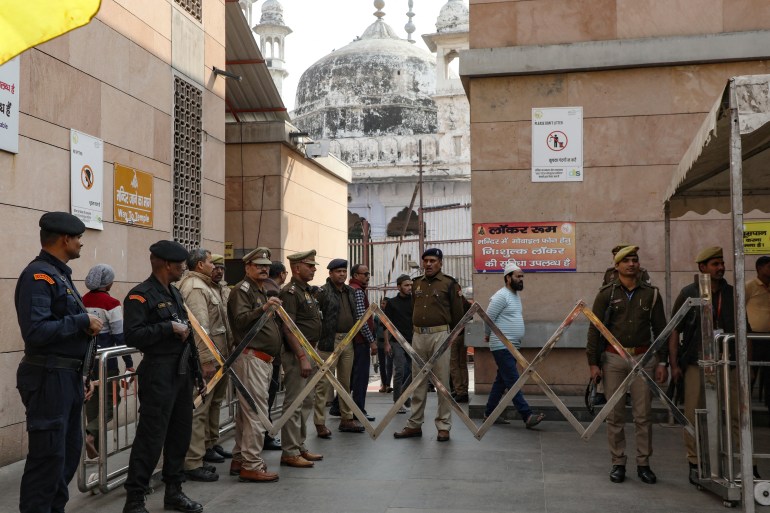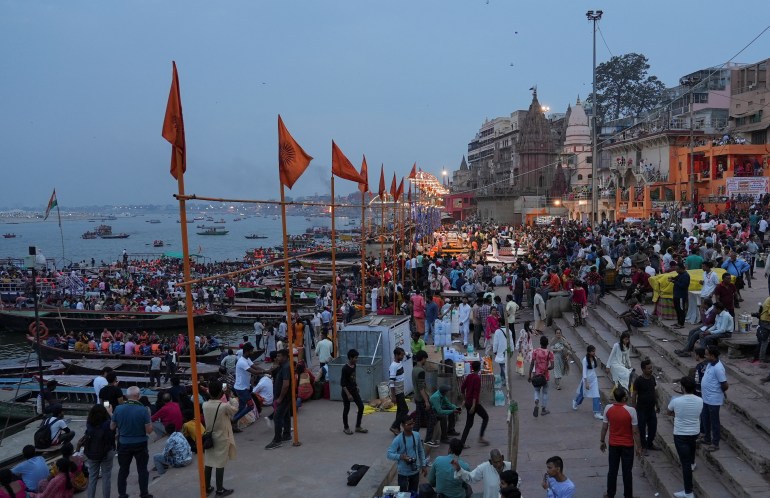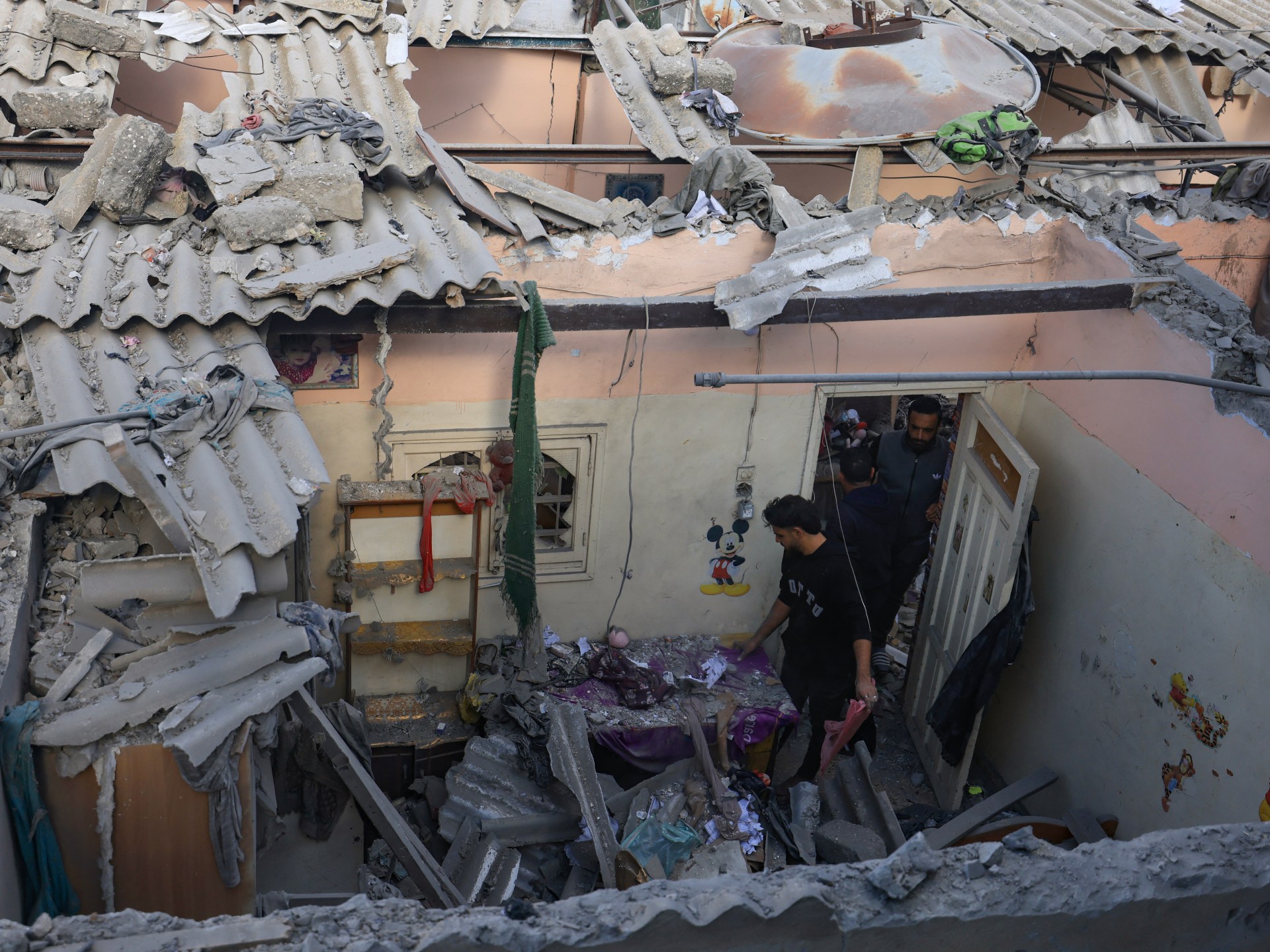Varanasi/Bengaluru, India – A festive atmosphere filled Varanasi, one of Hinduism’s holiest cities on the banks of the Ganga River.
It was Prime Minister Narendra Modi’s week dedicated the new temple to the Hindu deity Ram, where the 16th-century Babri Mosque once stood in the city of Ayodhya, 200 km (124 miles) to the north.
In Varanasi, the streets and boats on the river were decorated with saffron flags with images of Ram. Outside Varanasi’s famous and historic Kashi Vishwanath Temple, the smell of burning camphor and the sound of Indian classical music wafted through the air as pilgrims flocked to the temple in large numbers to offer their prayers.
But next door, to the west of the temple, the carnival spirit was replaced by an austere and somber atmosphere, with barricades and police officers greeting the crowds.
The officers were guarding it Gyanvapi Mosque – It is widely believed to have been built on the ruins of a 16th-century Kashi Vishwanath temple, which was demolished by the Mughal emperor Aurangzeb in 1669.
While the partially destroyed Kashi Temple has been reconstructed and stands next to the Gyanvapi Mosque, Hindu supremacist groups have been trying to retake the mosque for decades.

In May 2022, some Hindu well-wishers approached the Varanasi magistrate court seeking permission to hold services inside the mosque complex after a court-ordered video survey revealed that a “Shivling” – a symbol of the Hindu deity Shiva – was nearby of Wuzukhana was found. a fountain used by Muslim worshipers in the mosque.
This case gained prominence in January this year when a Opinion poll from the Archaeological Survey of India (ASI) stated, among other things, that there was a large Hindu temple on the site in front of the mosque and that there were also sculptures of Hindu deities in the basement of the mosque.
Within days, on January 31, Judge Ajaya Krishna Vishvesha of the Varanasi District Court issued an order saying that Hindus could pray in the basement of the mosque – an area that had been cordoned off for security reasons.
“The Varanasi district court made history today,” said Vishnu Jain, a Supreme Court lawyer representing the Hindu side said in a post on X.
A day later, videos and images of a priest offering prayers to Hindu deities in the basement of the mosque appeared on social media.
#REGARD A priest prays at the ‘Vyas Ji ka Tehkhana’ at the Gyanvapi Mosque in Varanasi on the orders of the district court.
Images confirmed by Vishnu Shankar Jain, the lawyer for the Hindu side in the Gyanvapi case pic.twitter.com/mUB6TMGpET
– ANI (@ANI) February 1, 2024
The Anjuman Intezamia Masajid, the committee that manages the Gyanvapi Mosque, rejected the local court’s order and is scheduled to contest the case in the Allahabad High Court in Prayagraj city, formerly known as Allahabad, on February 6.
“It seems like the justice system is against Muslims,” Rais Ahmad Ansari, a lawyer in Varanasi representing the Muslim side, told Al Jazeera.
Even in the face of increased momentum in India’s Hindu supremacist movement to target mosques, often supported by government authorities – a Centuries-old mosque was razed to the ground in New Delhi last week – the Gyanyavi structure case is of great political importance. Varanasi is the constituency of Modi, who leads the Hindu-majority Bharatiya Janata Party (BJP), which governs the country but has nevertheless developed close ties with the presidents and ministers of Western liberal democracies.
India will take part in the general elections, which are expected to take place between March and May.
“You feel a Hindu atmosphere everywhere around you”
Although the court order has not sparked violence or communal unrest, there is a sense of concern in the city’s Muslim neighborhoods, according to lawyer Ansari.
“Muslim shops closed after that [January 31] Hearing for fear of an argument. Namaz on Friday [prayers] was also greeted with a heavy security presence as hundreds gathered outside the Gynavapi Mosque to offer prayers. “There is a feeling of fear in the mind of every Muslim,” he said.
“It is still peaceful in Varanasi. But this peace feels uneasy,” he added.
Meanwhile, some news channels in the country hailed the local court order and the start of prayers at the mosque as “a major victory for Hindus” – a sentiment shared by several Hindus in Varanasi.
“We plan to visit the site and see the priest performing rituals in the mosque once our exams are over,” said Ayush Akash and Harshit Sharma, two 21-year-old political science students at Banaras Hindu University (BHU). AlJazeera.
Nita*, a Hindu devotee at the Kashi Vishwanath Temple, was also keen to pray at the temple.
“We feel great about it [court ruling]. If we are allowed to visit and pray, we will go. When Hindus pray in Varanasi, they have their own places of worship. My brother is a priest and can only worship in his temple. But if the priest allows us to go to Gyanvapi, we will certainly go,” she told Al Jazeera.
“People here have been going crazy since the inauguration Ayodhya Templesaid Nita.
“You can feel a Hindu atmosphere everywhere on the streets. It has never been like this before, but everyone is happy about the things that are happening and the fact that the Gyanvapi is a Hindu temple,” she added.

BHU’s Akash pointed out that people of all religions have been living together peacefully in Varanasi for years and are mature enough not to riot over the temple-mosque dispute.
“It might look like Hindus are in power and yes, some Muslims might be unhappy with the local court’s decision on Gyanvapi Mosque. But even if the ideologies differ in this city, this does not affect Hindu-Muslim friendship. This is the real Varanasi,” he said.
“All about politics”
Since Modi came to power in 2014, critics and human rights groups have accused his government of encouraging or facilitating the rise of Hindu supremacy, while cases of discrimination and violence against Muslims – who make up the country’s largest religious minority – have increased.
Hindu nationalist groups have also increasingly launched or intensified legal campaigns against mosques that are several centuries old, claiming they were built on the remains of Hindu shrines.
“There is a slogan that Hindu nationalists use which is: ‘Ayodhya Jhaki hain, Kashi-Mathura Baki Hain’,” said BHU’s Akash. Translated, the slogan reads: “Ayodhya is just a preview, Kashi.” [Varanasi] and Mathura remain. It is an indication of how the demolition of the Babri Masjid in 1992 in Ayodhya was used by Hindu majority groups to pursue similar actions with the Mughal-era mosques in Varanasi and Mathura.
“But right now in Varanasi, the Gyanvapi case is all about politics. It appears that the local court made its decision in time for the upcoming general elections. In my opinion, it is about uniting Hindus before the elections,” he said.
Syed Ali Nadeem Rezavi, secretary of the Indian History Congress and professor of medieval history at Aligarh Muslim University (AMU), expressed a similar view but stressed that this case was not comparable to Ayodhya.
“Nobody has ever said that before Gyanvapi Mosque Today it is said that there was no temple. It is clear that there was a temple and it was demolished. You can even see it with the naked eye,” Rezawi said.
“The reason the temple was broken is because of where Fight arises because the way the story of the temple demolitions is currently portrayed is a false narrative.”
Rezawi emphasized, as American scholar Richard Eaton’s book “Temple Desecration and Muslim States in Medieval India” explains, that in pre-colonial India every dynasty had a deity to which it prayed. If the ruler of the dynasty was defeated and the kingdom was taken over, then the deity and everything dedicated to the deity – including the temple – were destroyed by the triumphant ruler.
“This was an accepted practice among kings and that is exactly what it is [the emperor] Aurangzeb did so. But there are many theories as to why he demolished the Vishwanath Temple and built the mosque. Some historians say this was for religious reasons, others claim it was Aurangzeb’s way of punishing the Hindu family that managed the mosque as they had helped the Hindu king Shivaji escape,” he added.
“What Aurangzeb did should be condemned. But he lived in a time when there was no constitution. We have an Indian constitution that guarantees certain rights to people. So I don’t understand why the courts and the Prime Minister ignore this and commit a more heinous crime than Aurangzeb,” Rezwai said.
Constitutionally, India is a secular state. The country also passed a law in 1991 called the Places of Worship Act, which prohibits the conversion of places of worship and emphasizes that their religious character should be preserved.
But the final say on the mosque’s future rests with the country’s courts.
Abhishek Sharma, a devotee of the Kashi Temple and coordinator of the Swagatam Kashi Foundation, told Al Jazeera that “the people of Varanasi believe in ‘Ganga-Jamuna tehzeeb'”, a metaphor for social harmony that refers to the mingling of waters of Ganga and Yamuna draws rivers.
“We have always believed in living together in holiness. We pray that this peace will not be disturbed in any way,” he said.
*Some names have been changed to protect identity.






Recent Comments